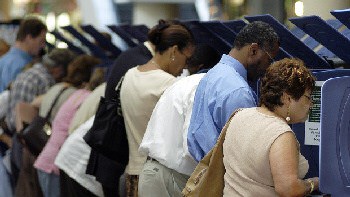President Obama Proposes Massive Global Health Initiative
By Merle David Kellerhals Jr.
Washington — The United States is launching a six-year global health initiative that will help some of the poorest regions of the world fight health challenges that kill people who could otherwise be saved with improved health care, says President Obama.
“That is why I am asking Congress to approve my fiscal year 2010 budget request of $8.6 billion — and $63 billion over six years — to shape a new, comprehensive global health strategy,” Obama said.
“We cannot wall ourselves off from the world and hope for the best, nor ignore the public health challenges beyond our borders.”
Secretary of State Hillary Rodham Clinton said the initiative will become a crucial component of American foreign policy. Investments in global programs to fight HIV/AIDS, malaria, tuberculosis and other preventable diseases will save lives and reduce maternal and child deaths, she said.
Deputy Secretary of State Jack Lew told reporters at a White House briefing May 5 that the global health initiative goes beyond current programs designed to fight HIV/AIDS, malaria and tuberculosis and will begin addressing the health needs of women, children and families in developing nations. It is also designed to curb the impact of neglected tropical diseases.
“Neglected tropical diseases are a symptom of poverty and disadvantage,” according to the World Health Organization. “Those most affected are the poorest populations often living in remote, rural areas, urban slums or in conflict zones.”
Although medically diverse, neglected tropical diseases share features that allow them to persist in conditions of poverty, where they cluster and frequently overlap. More than 1 billion people — one-sixth of the world’s population — suffer from one or more neglected tropical diseases, the WHO says.
“Research shows that a handful of neglected diseases could be eliminated with relatively modest resources and a sustained commitment,” Lew said. “Basic obstetric care can exponentially reduce the number of mothers and children who die in childbirth.”
Lew said basic health interventions for things like diarrheal diseases can sharply decrease the mortality of children under 5.
“We have the opportunity to cost-effectively contribute to political stability in a way that enhances our national security, while advancing our core humanitarian values,” he said.
The initiative is included in the fiscal year 2010 federal budget, which was presented to Congress May 7. The 2010 fiscal year begins October 1. The budget proposal was delayed by the Obama administration to permit more time to evaluate federal programs and make adjustments.
Lew said the health initiative does not include a listing of specific regions and targeted countries, but, he said, a lot of countries in Africa could use more help.
In the first year of the initiative, Lew said, the $8.645 billion includes $7.4 billion in funding for the Bush administration’s effective President’s Emergency Plan for AIDS Relief (PEPFAR) and President’s Malaria Initiative. Another $1.3 billion is for other global health priorities. Last year the United States provided $8.16 billion for global health issues; the increase this year is $459 million, he said.
Lew said this initiative builds, in part, on President Bush’s PEPFAR program, which provides lifesaving treatment for more than 2 million people, up from 50,000 people six years ago.
“Dramatic gains have also been achieved under the President’s Malaria Initiative, which in its third year alone has already reached more than 32 million people in 15 African countries,” Lew said.


